GLOBAL LAUNCH: Yuval Noah Harari's new book was published in Armenian simultaneously with the original
09/06/2024
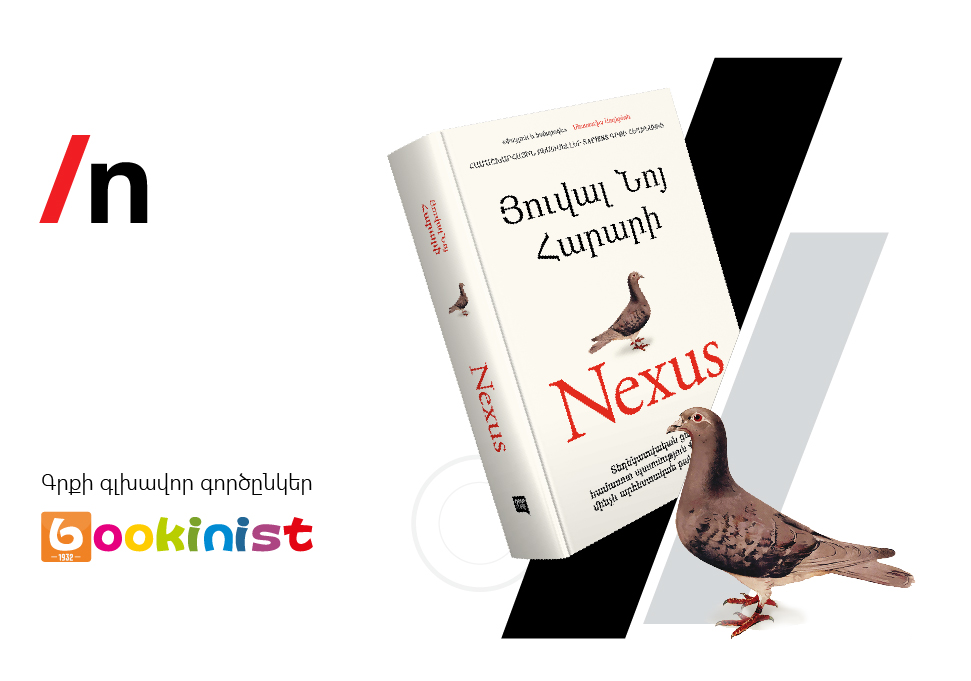
Newmag participates in a global book launch for the second time, presenting this year’s most anticipated bestseller on the same day as its original publication. We will read Yuval Noah Harari’s new book alongside the rest of the world.
Yuval
Noah Harari returns with a stunning new work, "NEXUS: A Brief History
of Information Networks from the Stone Age to AI". This book will be published
in over 20 countries on September 10. It explores humanity’s journey through
the information age and the critical steps to navigate our future. Armenia is
the only country in the CIS to release the book concurrently with the global
launch.
This groundbreaking popular science book takes us through four
key epochs of human history, revealing how the flow of electronic information
has shaped and sometimes shattered our world. Over the past 100,000 years,
Sapiens have acquired immense power. Yet despite our discoveries and
advancements, we face an existential crisis marked by environmental
degradation, political upheavals, and a surge in disinformation. As we enter
the era of artificial intelligence, Harari questions why, despite our achievements,
our nature remains so self-destructive.
Taking us from the Stone Age, through the canonization of the
Bible, the invention of print, the rise of mass media, and the recent
resurgence of populism, Yuval Noah Harari asks us to consider the complex
relationship between information and truth, bureaucracy and mythology, wisdom
and power. He explores how systems like the Roman Empire, the Catholic Church,
and the Soviet Union have wielded information to achieve their goals, for good
and ill. And he addresses the urgent choices we face as non-human intelligence
threatens our very existence.
Harari says, “We’re living through the most profound
information revolution in human history, but we can’t understand it unless we
understand what has come before. History, after all, isn’t the study of the
past – it is the study of change. It teaches us what remains the same, what
changes, and how things change. History is not deterministic, however, and
NEXUS doesn’t argue that understanding the past enables us to predict the
future. My goal is to show that by making informed choices, we can still
prevent the worst outcomes. Because if we can’t change the future, then why
waste time discussing it?”
Prof. Yuval Noah Harari is a historian, philosopher and
internationally bestselling author, who is considered one of the world’s most
influential public intellectuals today. His popular books include "Sapiens: A Brief History of Humankind",
"Homo Deus: A Brief History
of Tomorrow", "21
Lessons for the 21st Century", and the graphic adaptation series "Sapiens: A Graphic
History". All these books have been published in Armenian by newmag.
Newmag has adopted a new approach in the Armenian book market by
aligning with global trends for select bestsellers. In line with the global
premiere, extensive editorial and production work was done in advance.
Translators Davit Sargsyan
and Liana Zakaryan
were involved to ensure a timely release. Newmag aims to provide the Armenian
reader with a global perspective and stay current with international trends.
Bookinist has also joined
Newmag for this significant literary event. According to Heghine Medoyan, the
commercial director of Bookinst, this collaboration follows their successful joint presentation of
Fredrik Backman’s novel "My Grandmother Asked Me to
Tell You She’s Sorry". "The Armenian edition of NEXUS
will be available on the market simultaneously with the English version. Bookinist
is the main partner for this book publication. Harari’s works are among the
most read and sought-after both abroad and in Armenia, as evidenced by Bookinist's
sales figures."
Harari has sold over 45 million books in 65 languages, and they
have been recommended by Barack Obama, Bill Gates, Natalie Portman, Janelle
Monáe, Chris Evans and many others. Sapiens is a New York Times and Sunday
Times #1 bestseller that has spent an incredible 96 consecutive weeks in the
top 3 of the Sunday Times bestseller list.
On September 10, the book will be launched with a special
presentation on Armenia TV.
Pre-sales of the book have already started on the Newmag.am
website.
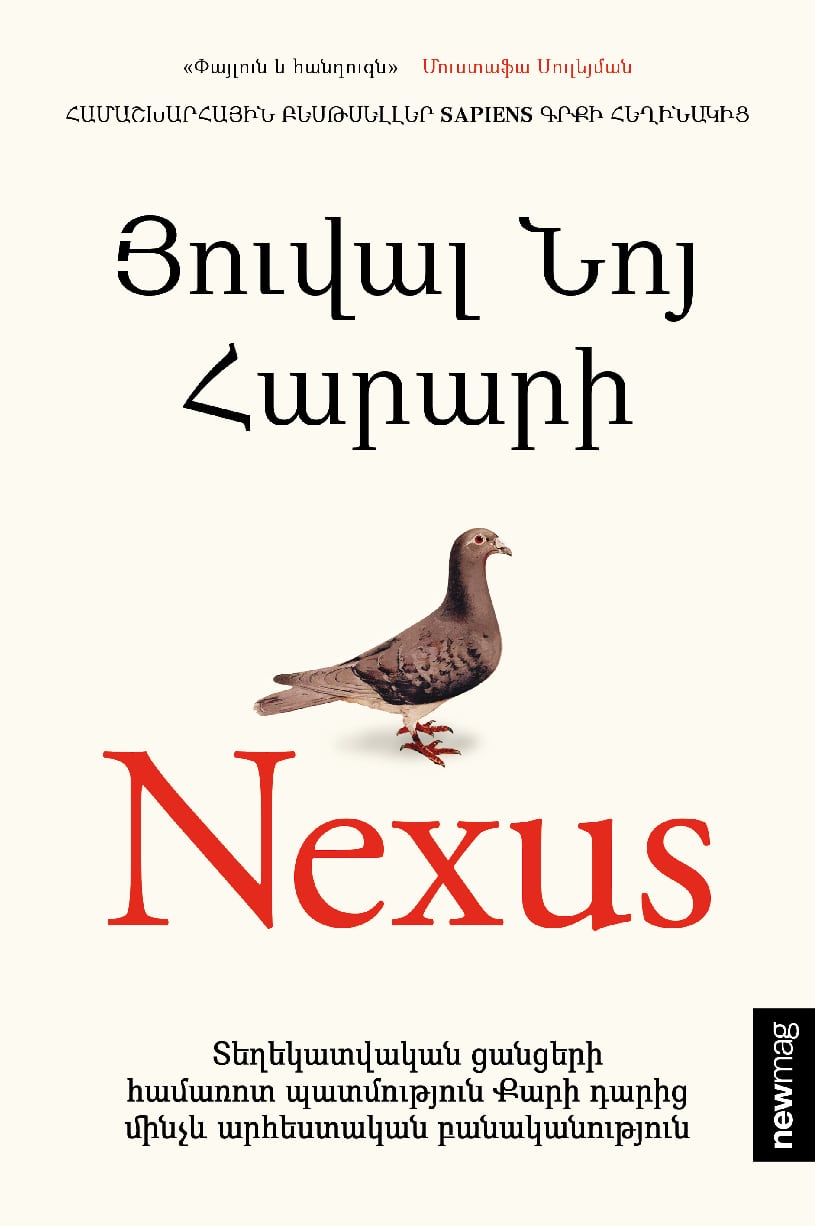
Yuval Noah Harari
7800 ֏
Description
For the last 100,000 years, we Sapiens have accumulated enormous power. But despite allour discoveries, inventions, and conquests, we now find ourselves in an existential crisis. The world is on the verge of ecological collapse. Misinformation abounds. And we are rushing headlong into the age of AI—a new information network that threatens to annihilate us. For all that we have accomplished, why are we so self-destructive?
Nexus looks through the long lens of human history to consider how the flow of information has shaped us, and our world. Taking us from the Stone Age, through the canonization of the Bible, early modern witch-hunts, Stalinism, Nazism, and the resurgence of populism today, Yuval Noah Harari asks us to consider the complex relationship between information and truth, bureaucracy and mythology, wisdom and power. He explores how different societies and political systems throughout history have wielded information to achieve their goals, for good and ill. And he addresses the urgent choices we face as non-human intelligence threatens our very existence.
Information is not the raw material of truth; neither is it a mere weapon. Nexus explores the hopeful middle ground between these extremes, and in doing so, rediscovers our shared humanity.
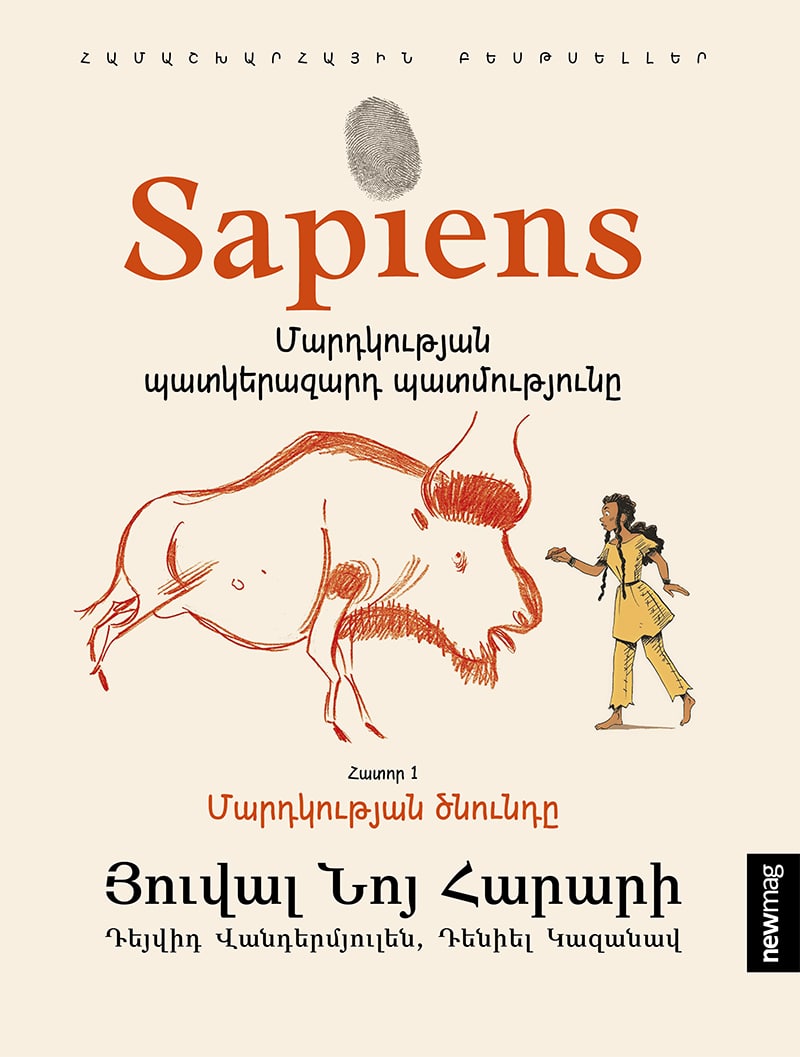
Yuval Noah Harari
14800 ֏
Description
One hundred thousand years ago, at least six different species of humans inhabited Earth. Yet today there is only one—homo sapiens. What happened to the others? And what may happen to us? In this first volume of the full-color illustrated adaptation of his groundbreaking book, renowned historian Yuval Harari tells the story of humankind’s creation and evolution, exploring the ways in which biology and history have defined us and enhanced our understanding of what it means to be “human.” From examining the role evolving humans have played in the global ecosystem to charting the rise of empires, Sapiens challenges us to reconsider accepted beliefs, connect past developments with contemporary concerns, and view specific events within the context of larger ideas. Featuring 256 pages of full-color illustrations and easy-to-understand text covering the first part of the full-length original edition, this adaptation of the mind-expanding book furthers the ongoing conversation as it introduces Harari’s ideas to a wide new readership.
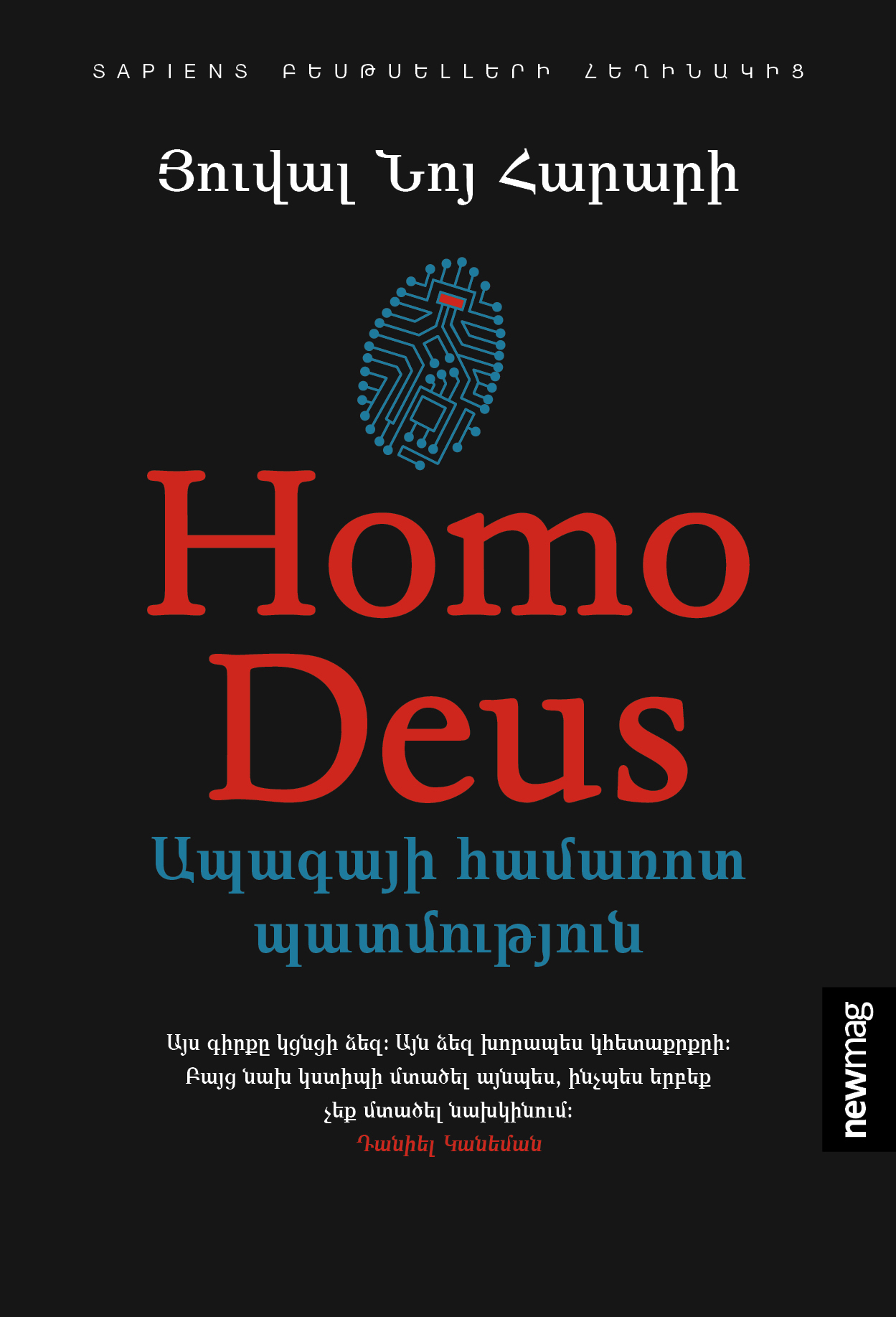
Yuval Noah Harari
7800 ֏
Description
Over the past century humankind has managed to do the impossible and rein in famine, plague, and war. This may seem hard to accept, but, as Harari explains in his trademark style—thorough, yet riveting—famine, plague and war have been transformed from incomprehensible and uncontrollable forces of nature into manageable challenges. For the first time ever, more people die from eating too much than from eating too little; more people die from old age than from infectious diseases; and more people commit suicide than are killed by soldiers, terrorists and criminals put together.
The average American is a thousand times more likely to die from binging at McDonalds than from being blown up by Al Qaeda. What then will replace famine, plague, and war at the top of the human agenda? As the self-made gods of planet earth, what destinies will we set ourselves, and which quests will we undertake? Homo Deus explores the projects, dreams and nightmares that will shape the twenty-first century—from overcoming death to creating artificial life. It asks the fundamental questions: Where do we go from here? And how will we protect this fragile world from our own destructive powers? This is the next stage of evolution. This is Homo Deus. With the same insight and clarity that made Sapiens an international hit and a New York Times bestseller, Harari maps out our future.
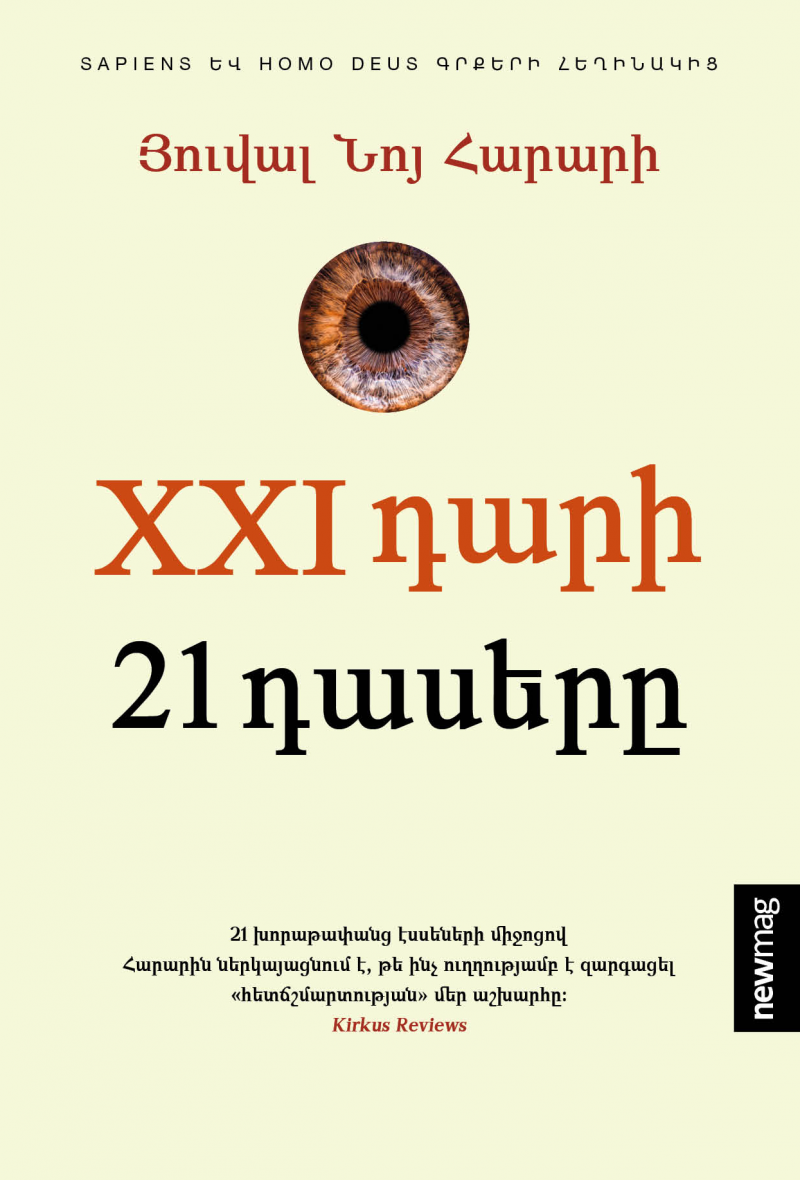
Yuval Noah Harari
7800 ֏
Description
Yuval Noah Harari's 21 Lessons for the 21st Century is a probing and visionary investigation into today's most urgent issues as we move into the uncharted territory of the future. As technology advances faster than our understanding of it, hacking becomes a tactic of war, and the world feels more polarized than ever, Harari addresses the challenge of navigating life in the face of constant and disorienting change and raises the important questions we need to ask ourselves in order to survive.
In twenty-one accessible chapters that are both provocative and profound, Harari builds on the ideas explored in his previous books, untangling political, technological, social, and existential issues and offering advice on how to prepare for a very different future from the world we now live in: How can we retain freedom of choice when Big Data is watching us? What will the future workforce look like, and how should we ready ourselves for it? How should we deal with the threat of terrorism? Why is liberal democracy in crisis?
Harari's unique ability to make sense of where we have come from and where we are going has captured the imaginations of millions of readers. Here he invites us to consider values, meaning, and personal engagement in a world full of noise and uncertainty. When we are deluged with irrelevant information, clarity is power. Presenting complex contemporary challenges clearly and accessibly, 21 Lessons for the 21st Century is essential reading.
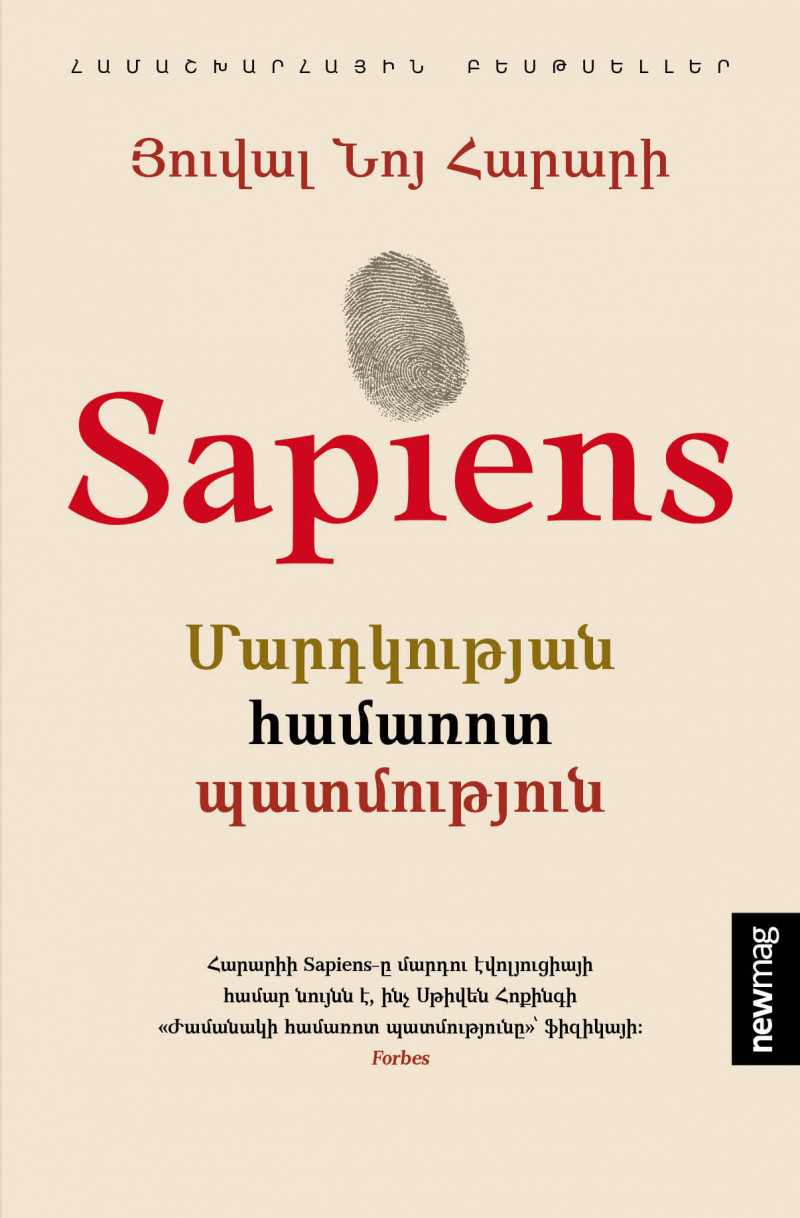
Yuval Noah Harari
7800 ֏
Description
100,000 years ago, at least six human species inhabited the earth. Today there is just one. Us. Homo sapiens.
How did our species succeed in the battle for dominance? Why did our foraging ancestors come together to create cities and kingdoms? How did we come to believe in gods, nations and human rights; to trust money, books and laws; and to be enslaved by bureaucracy, timetables and consumerism? And what will our world be like in the millennia to come?
In Sapiens, Dr. Yuval Noah Harari spans the whole of human history, from the very first humans to walk the earth to the radical – and sometimes devastating – breakthroughs of the Cognitive, Agricultural and Scientific Revolutions. Drawing on insights from biology, anthropology, paleontology and economics, he explores how the currents of history have shaped our human societies, the animals and plants around us, and even our personalities. Have we become happier as history has unfolded? Can we ever free our behavior from the heritage of our ancestors? And what, if anything, can we do to influence the course of the centuries to come?
Bold, wide-ranging and provocative, Sapiens challenges everything we thought we knew about being human: our thoughts, our actions, our power ... and our future.
Read also

Winterfest to feature David Georgyan’s sci-fi action novel Impedance (trailer)

At Winterfest 2026, Newmag will present Marianna Hakobyan’s “Don’t Change the Names” (trailer)

Closing and Award Ceremony of the “Sprout in Armenian – 2025” Competition at Newmag Winterfest

“I hope my story will inspire many and help them keep believing and dreaming.” Henrikh Mkhitaryan’s welcoming speech to Armenian fans (video)

